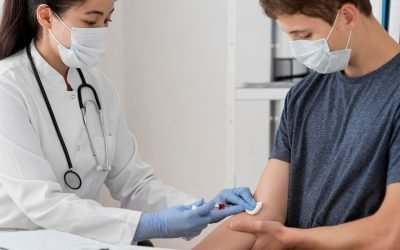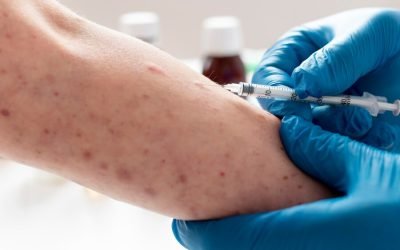Home » Expert Atopic Dermatitis Care in Punjab: Dr Parwaaz Matharoo, Your Trusted Dermatologist
Expert Atopic Dermatitis Care in Punjab: Dr Parwaaz Matharoo, Your Trusted Dermatologist

book your appointment

Introduction
Dr. Parwaaz Matharoo is a renowned dermatologist based in Punjab, specialising in diagnosing and treating atopic dermatitis. With years of experience and a commitment to providing the best atopic dermatitis care in Punjab, Dr. Matharoo is recognized as the best atopic dermatitis specialist in the region. This page aims to provide comprehensive information about atopic dermatitis and highlight why Dr Matharoo is the trusted choice for patients seeking effective treatment.

Understanding Atopic Dermatitis
Atopic dermatitis, commonly referred to as eczema, is a long-lasting skin disorder marked by inflammation, itchiness, and dryness. While it typically starts during childhood, it can continue into adult years. The precise cause of atopic dermatitis remains unclear, though it is thought to stem from a mix of genetic and environmental influences.
Causes and Risk Factors
Atopic dermatitis is a complex condition influenced by a combination of genetic and environmental factors. Understanding these causes and risk factors is crucial for managing and preventing flare-ups
Causes
- Genetic Predisposition:
- Family History: Individuals with a family history of eczema, asthma, or hay fever are more likely to develop atopic dermatitis.
- Skin Barrier Defects: Mutations in genes responsible for skin barrier function, such as the filaggrin gene, can lead to compromised skin integrity, making it more susceptible to irritants and allergens.
- Immune System Dysfunction:
- Overactive Immune Response: An exaggerated immune response to environmental triggers can lead to chronic inflammation and skin irritation.
- Allergic Reactions: Individuals with atopic dermatitis often have heightened sensitivity to allergens, leading to flare-ups.
- Environmental Factors:
- Irritants: Exposure to harsh soaps, detergents, and chemicals can aggravate the skin.
- Climate: Extreme temperatures, low humidity, and sudden weather changes can trigger symptoms.
- Allergens: Pollen, dust mites, pet dander, and certain foods can cause allergic reactions that worsen atopic dermatitis.
- Skin Infections:
- Bacterial Infections: Staphylococcus aureus and other bacteria can infect broken skin, exacerbating symptoms.
- Viral Infections: Viral infections like herpes simplex can lead to severe skin complications.
Dr. Parwaaz Matharoo: Expertise in Atopic Dermatitis

Dr Parwaaz Matharoo has extensive training and experience in dermatology, with a particular focus on providing the best Atopic Dermatitis Care in Punjab. He is known for his compassionate approach and dedication to improving the quality of life for his patients.
Education and Training
- Medical Degree: Graduated from a prestigious medical school.
- Specialization: Completed residency in dermatology with a focus on inflammatory skin conditions.
- Continuing Education: Regularly attends conferences and workshops to stay updated with the latest advancements in dermatology.
Personalized Patient Care
Dr. Matharoo believes in a patient-centric approach, tailoring treatments to meet the unique needs of each individual. He takes the time to understand each patient’s condition, lifestyle, and preferences, ensuring the best possible outcomes.
Diagnosis and Evaluation
Accurate diagnosis and thorough evaluation are essential for the effective management of atopic dermatitis. Dr. Parwaaz Matharoo employs a systematic approach to diagnose and evaluate each patient’s condition.
Diagnostic Methods

- Clinical Examination:
- Visual Inspection: A thorough examination of the skin to identify characteristic signs such as redness, dryness, and lichenification (thickened skin).
- Symptom Assessment: Discussion of symptoms, including itchiness, pain, and the frequency and duration of flare-ups.
- Patient History:
- Detailed Medical History: Collecting information about the patient’s personal and family history of atopic dermatitis, allergies, and other related conditions.
- Lifestyle and Environmental Factors: Understanding the patient’s daily routine, exposure to potential irritants, and living conditions.
- Allergy Testing:
- Skin Prick Tests: Identifying specific allergens that may trigger flare-ups.
- Patch Testing: Detecting delayed allergic reactions to various substances.
- Laboratory Tests:
- Blood Tests: Checking for elevated levels of IgE antibodies, which are often higher in individuals with atopic dermatitis.
- Skin Biopsy: In rare cases, a small sample of skin may be taken for further analysis to rule out other conditions.
Treatment Options for Atopic Dermatitis
Dr Matharoo offers the best Atopic Dermatitis Care in Punjab, providing a comprehensive range of treatment options tailored to the severity and specific needs of each patient.
Topical Treatments
- Moisturizers: Essential for maintaining skin hydration and preventing dryness.
- Corticosteroids: Effective in reducing inflammation and itching.
- Calcineurin Inhibitors: Alternative to steroids for long-term management.
Phototherapy
- UVB Therapy: Uses ultraviolet light to reduce inflammation and improve skin condition.
- PUVA Therapy: Combines psoralen medication with UVA light for severe cases.
Systemic Treatments
- Oral Medications: For moderate to severe cases, including antihistamines and immunosuppressants.
- Biologics: Advanced treatment targeting specific components of the immune system
Lifestyle and Home Remedies
Managing atopic dermatitis involves more than just medical treatments. Incorporating lifestyle changes and home remedies can significantly help control symptoms and prevent flare-ups. Dr Parwaaz Matharoo emphasizes the importance of a holistic approach that includes daily skincare routines, environmental adjustments, and natural remedies, offering the best Atopic Dermatitis Care in Punjab.
Skincare Routines
Maintaining a consistent skincare routine is essential for managing atopic dermatitis. Proper care helps to keep the skin hydrated, reduce irritation, and prevent infections.
- Gentle Cleansing:
- Opt for gentle, unscented cleansers to prevent skin irritation.
- Avoid hot water; opt for lukewarm water instead.
- Limit bathing time to 10-15 minutes to prevent drying out the skin.
- Regular Moisturizing:
- Apply a generous amount of moisturizer immediately after bathing to lock in moisture.
- Use thick, ointment-based moisturizers or creams rather than lotions.
- Moisturize the skin multiple times a day, especially during dry or cold weather.
- Avoiding Irritants:
- Select garments crafted from soft, breathable materials such as cotton.
- Avoid wearing wool or synthetic fabrics that can irritate the skin.
- Opt for hypoallergenic laundry detergents and steer clear of fabric softeners.

Environmental Adjustments
Making changes in the living environment can help reduce exposure to triggers and create a more skin-friendly atmosphere.
- Humidity Control:
- Use a humidifier to maintain optimal moisture levels in the air, especially during winter when indoor air tends to be dry.
- Aim for a humidity level of around 40-50% to prevent the skin from drying out.
- Allergen Avoidance:
- Keep the home clean and dust-free to reduce exposure to dust mites.
- Use an allergen-proof mattress and pillow covers.
- Frequently launder bedding and curtains in hot water to remove allergens.
- Pet Dander:
- If allergic to pet dander, keep pets out of the bedroom and off furniture.
- Regularly bathe and groom pets to minimize dander.
Natural Remedies
In addition to medical treatments, some natural remedies can help soothe the skin and reduce symptoms of atopic dermatitis.
- Oatmeal Baths:
- Incorporating colloidal oatmeal into your bath can help soothe itching and reduce inflammation.
- Soak in an oatmeal bath for 10-15 minutes, then rinse and moisturize the skin.
- Coconut Oil:
- Coconut oil has moisturizing and anti-inflammatory properties.
- Apply virgin coconut oil to the affected areas after bathing and before bedtime.
- Aloe Vera:
- Aloe vera gel can soothe and hydrate irritated skin.
- Use pure aloe vera gel and apply it directly to the affected areas.
Stress Management
Stress is a known trigger for atopic dermatitis flare-ups. Implementing stress-reducing techniques can help manage the condition more effectively.
- Relaxation Techniques:
- Practice deep breathing exercises, meditation, or yoga to reduce stress levels.
- Engage in activities that promote relaxation and well-being, such as reading or listening to music.
- Regular Exercise:
- Engaging in physical activity alleviates stress and enhances overall well-being.
- Choose low-impact exercises like walking, swimming, or cycling to avoid excessive sweating, which can irritate the skin.
- Adequate Sleep:
- Ensure a regular sleep schedule and create a comfortable sleep environment.
- To improve sleep quality, refrain from consuming caffeine and using electronic devices before bedtime.
Diet and Nutrition

While diet alone cannot cure atopic dermatitis, certain dietary adjustments can help manage symptoms and improve skin health.
- Anti-Inflammatory Foods:
- Incorporate foods rich in omega-3 fatty acids, such as fish, flaxseeds, and walnuts, which have anti-inflammatory properties.
- Eat a balanced diet with plenty of fruits, vegetables, and whole grains.
- Identify Food Triggers:
- Keep a food diary to track potential food triggers that may worsen symptoms.
- Common triggers include dairy, eggs, soy, and gluten; consult with a healthcare provider before making significant dietary changes.
- Stay Hydrated:
- Stay hydrated by drinking ample water throughout the day to maintain healthy skin.
- Avoid sugary drinks and excessive caffeine, which can dehydrate the body.
Patient Education and Support
Dr. Matharoo emphasizes the importance of patient education in managing atopic dermatitis. He provides resources and support to help patients understand their condition and treatment options.
Educational Materials
- Brochures and Pamphlets: Detailed information about atopic dermatitis and care strategies.
- Online Resources: Access to articles, videos, and support groups through The House of Skin website.
Workshops and Seminars
- Patient Workshops: Interactive sessions to educate patients about skincare and treatment.
- Professional Seminars: Presentations on the latest research and treatment advancements.
Why Choose Dr. Parwaaz Matharoo?

Selecting the right specialist for treating atopic dermatitis is critical for achieving the best outcomes, and Dr Parwaaz Matharoo offers the best Atopic Dermatitis Care in Punjab. Here are the key reasons why Dr Parwaaz Matharoo is the preferred choice for patients in Punjab.
Key Differentiators
Extensive Experience and Expertise:
- Specialized Training: Dr. Matharoo has undergone rigorous training in dermatology, with a focus on inflammatory skin conditions like atopic dermatitis.
- Years of Practice: With many years of clinical experience, Dr. Matharoo has successfully treated numerous patients with atopic dermatitis, earning a reputation for excellence.
Patient-Centered Care:
- Personalized Treatment Plans: Each treatment plan is tailored to meet the specific needs of the patient, taking into account their unique condition, lifestyle, and preferences.
- Holistic Approach: Dr Matharoo emphasizes a comprehensive approach to treatment, addressing the symptoms, underlying causes, and contributing factors.
Advanced Diagnostic and Treatment Techniques:
- State-of-the-Art Facility: The House of Skin is equipped with the latest technology and tools for accurate diagnosis and effective treatment.
Innovative Treatments: Dr. Matharoo stays abreast of the latest advancements in dermatology, offering cutting-edge treatments and therapies for atopic dermatitis.
Commitment to Patient Education:
- Informative Consultations: Dr. Matharoo takes the time to educate patients about their condition, treatment options, and self-care practices.
- Supportive Resources: Access to educational materials, workshops, and online resources helps patients manage their condition effectively.
Positive Patient Outcomes:
- Success Stories: Numerous patients have experienced significant improvement under Dr. Matharoo’s care, as evidenced by their testimonials and case studies.
- High Patient Satisfaction: Dr. Matharoo’s compassionate care and effective treatments have led to high levels of patient satisfaction and trust.
Choosing Dr. Parwaaz Matharoo means opting for expert care, advanced treatments, and the best Atopic Dermatitis Care in Punjab. His extensive experience, patient-centred approach, and commitment to ongoing education make him the best choice for patients seeking relief from atopic dermatitis in Punjab.
FAQs About Atopic Dermatitis and Treatment with Dr. Parwaaz Matharoo
- Atopic dermatitis, also known as eczema, is a chronic skin condition that causes inflamed, itchy, and dry skin. It often begins in childhood but can continue into adulthood. The exact cause is unknown, but it is believed to be related to a combination of genetic, environmental, and immune system factors.
- Common symptoms of atopic dermatitis include dry, scaly skin; intense itching; red or inflamed patches; and thickened, leathery areas of skin. These symptoms typically appear on the face, neck, hands, and the insides of the elbows and knees.
- Triggers vary from person to person but commonly include irritants (such as soaps and detergents), allergens (such as dust mites, pollen, and pet dander), stress, weather changes, and certain foods.
- Dr. Matharoo diagnoses atopic dermatitis through a combination of clinical examination, patient history, and diagnostic tests such as allergy testing and blood tests. He carefully evaluates each patient’s symptoms and potential triggers to provide an accurate diagnosis.
- Dr. Matharoo offers a range of treatments, including topical treatments (moisturizers, corticosteroids, and calcineurin inhibitors), phototherapy (UVB and PUVA therapy), and systemic treatments (oral medications and biologics). He tailors each treatment plan to the individual needs of the patient.
Book Your Consultation Today
Take the first step towards the effective management of atopic dermatitis by booking a consultation with Dr Parwaaz Matharoo.
Contact Information
- Address: Kiran Hospital, Gill Rd, Opp. Janta Nagar Chowk, Dasmesh Nagar, Ludhiana, Punjab 141003
- Phone: +91 82735 00120
- Email: pmatharoo14@gmail.com
- Online Booking: Visit [https://thehouseofskin.in/] to book your appointment online.
Get Consultation With Our Experts
Schedule a consultation today and embark on a journey towards informed decision-making and success. Your challenges, our expertise – let’s collaborate for a brighter future.
